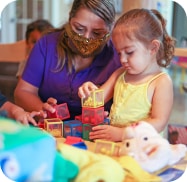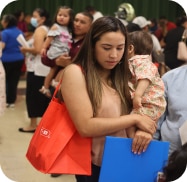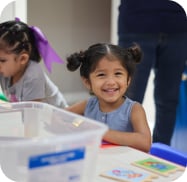Who We Served in 2022-2023
6,340
Parents
7,573
Children

489
Providers

86%
Latino / Hispanic
Knowledge Gained
72%
Parents in our Parent-Child Education Program (PCEP) increased knowledge in early childhood development
93%
Children in our Head Start and Early Head Start (HS/EHS) programs meet or exceed standards in school readiness domains
49%
Providers in our Quality Child Care Matters (QCCM) program increased their knowledge of licensing standards
Economic Mobility
64%
Parents in AVANCE to College enrolled in continuing education
80%
Children in our HS programs are kindergarten ready
71.59%
Child care providers in Business Coaching received Child Care Relief Funding
Social Capital
58%
Parents in PCEP demonstrated an increase in parent connectedness
95%
Children in HS/EHS met or exceeded social emotional development expectations
43%
Child care providers in QCCM demonstrated an increase in provider connectedness
What people say about us.
“AVANCE is the difference between before and now. It has given me the tools to better understand my daughter's needs and it showed me how to be a better mother.”
Maribel Bautista
PCEP Graduate (AVANCE-North Texas)
Evidence and Investigations
There are many studies have been conducted to examine the impact of AVANCE programs, including randomized control trials, longitudinal studies, and a quasi-experimental study. Overall, the studies show the two-gen impact of our programming:

Parents who participate in PCEP provide more educationally stimulating home environments for their infants, have more positive attitudes towards childrearing and their role as teachers of their children, and have better parenting skills compared to non-PCEP parents.

Ten years after participation PCEP parents had experienced incredible increases in educational attainment, full-time employment and homeownership

Children who participate in PCEP have better attendance and better reading outcomes than children who did not participate in PCEP.

Children who participated in PCEP were more likely to attend pre-K, be school-ready at kindergarten entry, and have better attendance than a comparison group of demographically similar students